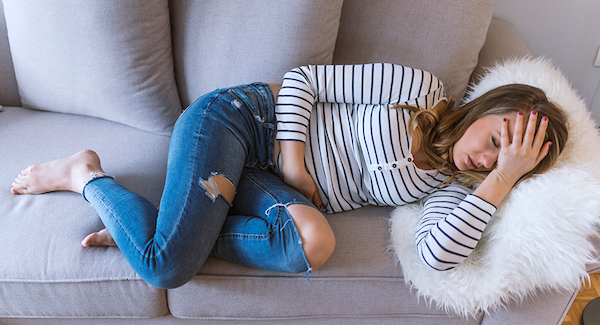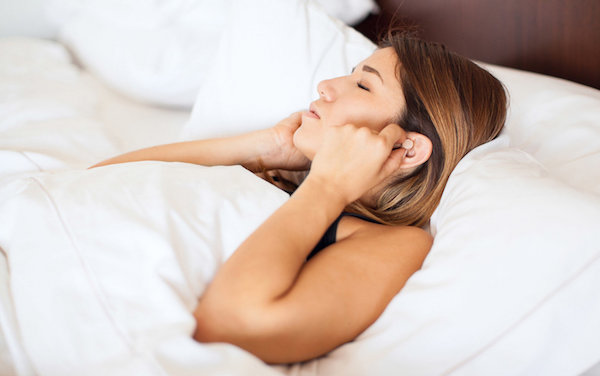We’ve all been there where you’ve had to sleep on a sofa. It could be because you’ve got guests over or you’re staying at someone else house who doesn’t have a spare bed or mattress.
Sleeping on a sofa can be uncomfortable but how safe is it for your body? We’ll outline how to make your sleeping experience more comfortable on a sofa, so you don’t feel exhausted in the morning when you wake up.
Why you shouldn’t sleep on the sofa?
1. Not a Natural Sleeping Position
If you regularly sleep on a sofa, then over time this can lead to your muscles becoming strained especially in your neck and back. It can then develop into a chronic condition if it remains neglected; this is because a standard sofa isn’t designed to support your body while you sleep.
Because a sofa doesn’t provide adequate support, it means that you'll be constantly woken up because it can’t support your body in your preferred sleeping position, especially if you prefer to sleep on your side which is the most common position when sleeping on a sofa.

This constant disturbance means that you'll struggle to reach a deeper REM sleep which is where the body’s main restoration and repair phase takes place.
If you do need to sleep on the sofa, then it’s best if it can support you in your favoured position. This will allow for full natural spine alignment because most sofas will not keep your spine aligned which can lead to you waking in pain.
2. Wrong Material
The material that sofas are made from aren’t for sleeping on and are very different from the material that’s used to produce mattresses. You’ll find that this makes you hotter throughout the night because the material doesn’t absorb heat as efficiently.
This lack of heat absorption can cause a restless night especially if you live somewhere with high temperatures or humidity.
You’ve probably noticed that when you sit on a sofa you’ll sink into the cushion material and you won’t be supported. This is because the cushions use a lighter foam filling whereas a mattress has supportive layers.
It means that you won’t be supported when you sleep on a sofa causing you to sink into it, leading to poor quality sleep uncomfortably.
3. Joint Pain
One thing that makes it so hard to treat back pain is because there often isn’t a specific injury that causes it. It can often gradually develop over time, and before you realise, it’s become a big problem.
This back pain can be caused by sleeping in the wrong position consistently over a prolonged period.
Sleeping on a sofa increases the amount of pressure that’s placed on your spine because you’re often be lying in a cramped position that doesn’t allow you to relax fully. This can cause chronic issues such as joint pain, ligament damage and disk issues.
4. Other Distractions
In addition to the possibility of being disturbed by lighting, sleeping on the sofa can also increase the likelihood of being interrupted by other people in the house. This is even more likely if you're sleeping on a sofa in a common area of the home such as a living room or the ground floor.
It also means that you may only be able to go to sleep when the last person in the house goes to bed, and you’ll often be woken up when the first person wakes up in the morning. All this leads to a lack of quality sleep.
5. Disturbing Light
In the average home, sofas will commonly be located in the communal areas of the house, which also often happens to have the lightest sources. As humans we sleep best when there's total darkness; however, when you sleep on a sofa, this is unlikely to be the case.
Sleeping on the sofa will mean that you may be disturbed by lights from outside and appliances around the general living space including electronic appliances. This constant disturbance will prevent you from getting full REM sleep leaving you feeling groggy, tired and irritable in the morning.
6. Damage the Sofa
Everyday sofas aren’t designed to be slept on, so if you move throughout your sleep, then this can cause damage to the frame.
It's because when you move in your sleep, you have less control over your body because you’re asleep, which means your movement can be much stronger. This requires more support than what a sofa can provide which can lead to the sofa being damaged.
Also, the seat cushions can begin to sag in areas where your weight is concentrated which is usually around the centre of the sofa where the middle of your body is.
This will make your sofa deteriorate and generally look worse because the centre will be sagging, but the sides will remain in its original shape.
How to make your sleeping experience better
Despite the negatives, there will be some occasions when you can’t avoid sleeping on a sofa, and it’s the best option you have. There are several steps you can take to make your sleeping experience more comfortable.
1. Protect the Sofa
Before you go to sleep on a sofa, you should place a blanket in between your body and the surface of the sofa.
This will not only increase comfort but also form a protective layer for your sofa to reduce the wear and tear especially if the sofa is made from leather which can crack or split under the continued pressure.
It’s not even the weight that can cause damage but also for example if you use hair products or moisturiser then this can transfer onto the sofa. Once you have finished sleeping on the sofa, it’s recommended that you give it a quick wipe down with a damp cloth.
2. Ear Plugs & Eye Masks
Several sleep accessories can improve the quality of your sleep without breaking the bank. The first is a sleep mask which can be used to block out light, so you aren’t disturbed by external light.
Sleep masks shouldn’t only be used when you’re on the sofa as we recommend them for sleep no matter what surface you’re sleeping on.

Ear plugs work well with sleep masks and mute external sounds which means you can settle off to sleep much quicker. This is even more important if you’re sleeping on a sofa because you’ll likely be near other people who can disturb you from your sleep.
3. Don’t Do it For a Prolonged Period
There will be some occasions where you can’t avoid sleeping on a sofa, but many of the more severe effects can be avoided by not sleeping on a sofa consistently for an extended period.
A night here or there probably isn’t going to make a difference but ideally, if you know you’re going to be without a traditional bed for a long period then there are several alternatives such as air mattresses or a sofa bed. These alternatives give you a more comfortable sleeping surface.
4. Re-create Your Bed as Much as You Can
The idea here is to make your sofa as close to the same experience as you would with your regular bed or sleeping surface. It’s common that it won’t have identical proportions to your bed so even though you may not be able to lie completely flat you need to maximise the amount of space you have available.
First, you can remove the back cushions which will make the surface you have to sleep on broader. You can also remove the arm cushions, but if the sofa is still too short, then you can use another chair to prop your legs up on.
The foetal position is the most common sleeping position for a sofa because of the smaller amount of space, but this should be the last resort because of the strain it can place on your spine.
5. Make the Surface Firmer
Because of the natural sink that you get with a sofa, this leaves you feeling unsupported which makes your spine more vulnerable and prone to injury.
To counteract this, you should place a thick blanket or surface on top of the cushions to create a firmer surface which will help to align your spine so you can get a more restful sleep.
6. Stretch Upon Waking
So we’ve outlined why sleeping on a sofa is a bad idea, but if there’s no suitable alternative and you’re going to have to sleep on one for several nights, then you’re going to wake up with sore joints especially if it’s something that you don’t regularly do.
With this in mind, it’s essential that you perform stretches each morning focusing on your neck, shoulders and back.
It’s also recommended to perform these stretches before you go to sleep to prepare your body to sleep in a tighter space and also decrease the amount of strain you feel when you wake.
